- The Fed lowers rates to combat slowing growth, a recession, or crisis.
- The economy responds favorably.
- Inflation begins to pick up as pricing power returns.
- The economy is strong enough to allow the Fed to gradually raise interest rates to slow inflation without harming the improving economic climate.
Difficult Challenge To Balance Growth And Inflation
In the present day, the Fed has a problem with point 4 above. The economy is still relatively fragile, but inflation is picking up. From USA Today:
Consumer prices last month posted their sharpest increase in 15 months as inflation continued a recent acceleration from unusually low levels. The consumer price index jumped 0.4% after rising 0.3% in April, the Labor Department said Tuesday. Economists had expected a 0.2% increase. Over the past 12 months, consumer prices have increased 2.1%. “The chances that (the Fed) will raise interest rates before the middle of next year are increasing,” economist Paul Dales of Capital Economics said in a research note Tuesday.
Fed Expected To Lower Growth Projections
The Fed prefers to tighten policy when inflation and economic growth are picking up simultaneously, which is not what we have now. From USA Today:
The Federal Reserve is expected to lower its economic growth forecast this week, but falling unemployment and rising inflation could prompt policymakers to project a slightly more rapid rise in interest rates.
2009: An Extreme Case To Study
Since the market, rather than the Fed, ultimately sets interest rates, the Fed closely monitors market expectations for the economy and inflation. While beyond the scope of this article, in extreme terms maximum economic pessimism tends to be a “fear of deflation” state. On the other end of the confidence spectrum, when investors are confident about stronger economic growth, their expectations for future inflation tend to increase. While it looks a bit noisy, the chart below illustrates the concepts. The upper portion of the chart tracks inflation expectations. If investors are concerned about inflation they prefer to own inflation-protected bonds (ARCA:TIP). When investors are concerned about a slowing economy and/or disinflation, they are comfortable with standard treasuries (ARCA:IEF). In 2008 fear of deflation was increasing and stocks got hammered (left side of chart below). The right side of the chart shows as expectations for inflation began to pick up, the stock market eventually followed.
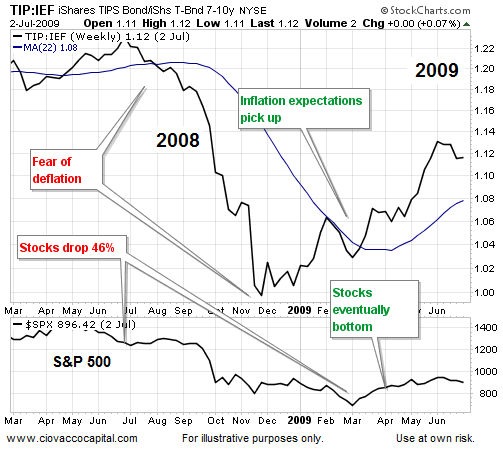
2009: Growth Expectations Were Picking Up
As noted earlier, the Fed prefers to see inflation expectations and economic expectations pick up simultaneously. One way to monitor investor expectations about future economic activity is to study the demand for growth stocks (NYSE:IWF) relative to value stocks (NYSE:IWD). The left side of the chart below shows increasing economic pessimism as stocks fell off a cliff in late 2008. The right side of the chart shows as demand for growth stocks picked up, the general market eventually followed.
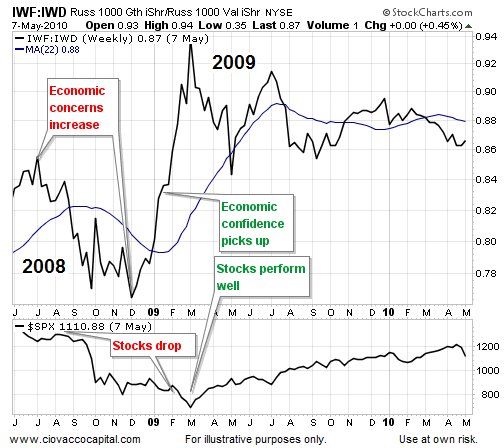
2014: Growth Expectations Have Been Dropping
Unfortunately for the Fed, the same growth vs. value ratio has been weakening over the past few months, which is indicative of waning economic confidence.
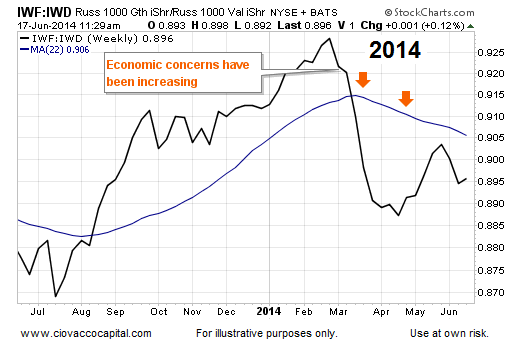
2014: Inflation Expectations Are Picking Up
The present day version of the TIP to Treasury ratio has been rising, which is indicative of increasing concerns about future inflation.
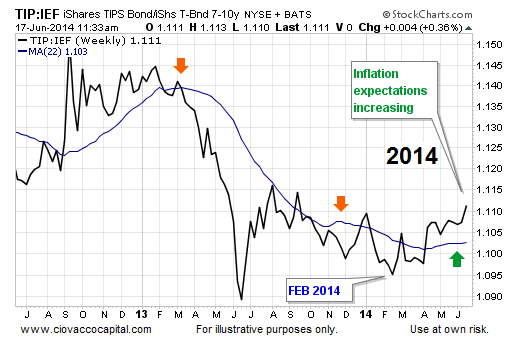
Fed May Have To Raise Rates Sooner Than Expected
The recent rise in inflation expectations and reported inflation could cause the Fed to begin signaling a rate increase is coming sooner than the market currently expects. Slowing growth expectations and rising inflation expectations tell us to keep an open mind about a more difficult environment for stocks in the months ahead.
How Concerned Should We Be?
At this point, it is more of a “we need to be aware of this” rather than a “sprint for the equity exits” scenario. If there is anything that can move markets quickly, it is a surprise on the Fed policy front. Therefore, it is prudent to respect the increasing odds that the Fed could spook stocks in the weeks and months ahead. Our concerns would diminish somewhat with either better than expected economic news or signs that inflation remains tame.
Investment Implications - No Problem, If You Have A Plan
There is no need for us to guess or anticipate what the Fed will say this week or how the market will react to it. In fact, anticipation investing can be harmful to your sleep cycle and returns. For example, anticipating a major negative fallout from Iraq has not been a good strategy thus far. Even our simple “how-to-handle-Iraq” plan has returned “don’t overreact” responses from the decision tree. Since the market’s pricing mechanism reflects the aggregate opinion about all relevant inputs, including Iraq and the Fed, we can continue to use 1,880 and 1,902 as “don’t get too concerned about the Fed or Iraq” guideposts.
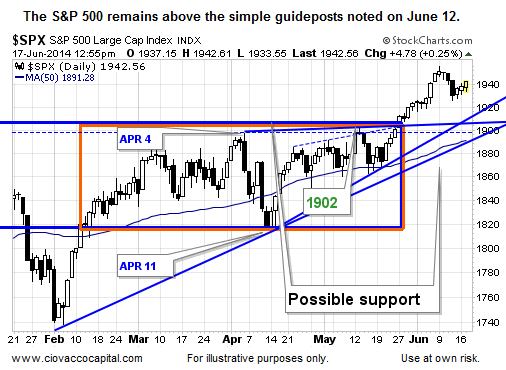
Bond Vigilantes Can Force The Fed’s Hand
Why would the Fed raise rates if the strength of the recovery is in doubt? Earlier in this article we noted:
Since the market, rather than Fed, ultimately sets interest rates, the Fed closely monitors market expectations for the economy and inflation.
What do we mean by the market, rather than the Fed, setting interest rates? If the market believes the Fed is willing to let the inflation genie out of the bottle, it will become unattractive to own bonds. If it is unattractive to own bonds, then investors will sell bonds. When investors sell bonds, interest rates will rise with or without the Fed. This is the concept of bond vigilantes that was outlined in more detail on May 7.
